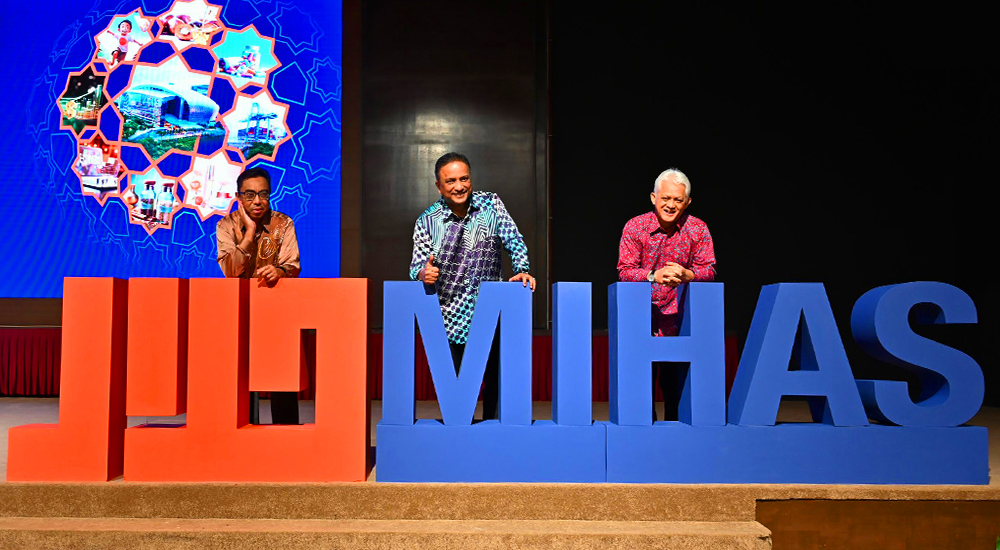Abu Dhabi, UAE: HE Rashid bin Fahad, UAE Minister of Environment and Water, today inaugurated the Global Forum for Innovations in Agriculture. The Minister inaugurated the event on behalf of HH Sheikh Mansour bin Zayed Al Nahyan, Deputy Prime Minister of the UAE, Minister of Presidential Affairs, and Chairman of the Abu Dhabi Food Control Authority (ADFCA).
In his inaugural speech read out on his behalf by the Minister of Environment, HH Sheikh Mansour said the UAE was among the countries in the region that supported innovations in sustainable agriculture. “In spite of the hard climatic conditions and water scarcity, the UAE has succeeded, thanks to political will and the adoption of modern farming techniques, in developing a sustainable farming sector that protects the environment and contributes to meeting some of the food requirements of the country,” HH pointed out.
The Global Forum for Innovations in Agriculture (GFIA), held under the theme ‘Driving Innovation for an Agricultural Revolution,’ is the world’s largest showcase of game-changing innovations in sustainable agriculture and has brought together an unprecedented array of world-renowned innovators, investors, food producers, retailers, governments, scientists, NGOs and agricultural organisations.
Organised in strategic partnership with ADFCA and with official support from the UAE’s Ministry of Environment and Water and Ministry of Presidential Affairs, GFIA seeks to highlight the sustainable agriculture initiatives and innovations being planned and deployed across the world. The multi-faceted event includes an exhibition with over 125 exhibitors plus an 1800-delegate conference comprising keynote sessions, panel discussions, an African Ministerial discussion and 150 innovation presentations by 180 speakers.
“We at GFIA are honoured to have the support of HH Sheikh Mansour and the UAE Government in hosting this pioneering forum,” said Mohamed Jalal Al Rayssi, Director of Communication and Community Service at ADFCA, adding that Abu Dhabi is at the forefront of agricultural innovation in the region.
Under the title ‘Visions for an Agricultural Revolution’, the Opening Ceremony was chaired by BBC journalist and broadcaster Stephen Sackur. It also included Keynote Speeches from Bill Gates, co-founder of the Bill & Melinda Gates Foundation, Dr Frank Rijsberman, CEO of CGIAR, Dr Mark Post, the scientist behind the Google-funded lab burger, and Andras Forgacs, CEO of Modern Meadow and pioneer of cultured meat and leather.
Addressing the assembled dignitaries via video address, Bill Gates used his speech to emphasise the significance of technological innovation in combating the problems of the poor.
“In a world where most of the poorest are farmers, investments in agriculture are the best weapons against hunger and poverty. To help the poorest seize agriculture’s potential, we need to unleash as much innovation as possible,” said Gates.
Dr Frank Rijsberman, CEO of CGIAR, the world’s largest consortium of agricultural research institutes, focused in his speech on why dry areas should invest massively in innovation to ensure food security. “History shows us that the most effective route to keeping global food prices low is to massively increase investment in agricultural innovations,” said Dr Rijsberman.
 Dr Mark Post, Professor of Physiology at Maastricht University, is better known as the scientist behind the world’s first lab-grown hamburger – an innovative approach to creating genuine meat from animal stem cells rather than vegetable substitutes. Mr Post’s speech focused on the environmental and ethical benefits of producing meat from designated muscle stem cells.
Dr Mark Post, Professor of Physiology at Maastricht University, is better known as the scientist behind the world’s first lab-grown hamburger – an innovative approach to creating genuine meat from animal stem cells rather than vegetable substitutes. Mr Post’s speech focused on the environmental and ethical benefits of producing meat from designated muscle stem cells.
Andras Forgacs from Modern Meadow also spoke about the value of tissue engineering techniques based on bioprinting, the 3D assembly of tissues driven by computer-controlled processes. “Cultured meat and leather can provide a safe, sustainable, economical and ethical alternative to the traditional livestock industry,” said Forgacs.
Following the Keynote Speeches, The minister, accompanied by senior officials, toured the exhibition and visited several stands showcasing innovations for improved productivity in arid areas. These included Chahtech, a Tunisian company that has invented a new underground irrigation technology, and Ecovative, a US-based company that has developed a mushroom-based biodegradable plastic packaging substitute.
Day One of GFIA also featured the GFIA Power Sessions, the world’s largest and most diverse presentation of big ideas on sustainable agriculture – a total of 52 innovators across four theatres each had 15 minutes to demonstrate their technology or projects.
They ranged from a variety of technological advances in reducing water consumption and new generations of automated robotic systems for pest control to The Farmery, a growing/retail environment actually within a supermarket, and an experimental ‘sea farm’ producing seaweeds for feed and food production.
There were two well-attended Breakout Sessions. Stephen Sackur chaired The BIG Investment Debate looking at the most promising technologies and research for investment and how innovations can be brought to market more effectively. A second session, The E-Agriculture Revolution, looked at the application of information technology in agriculture and how it will change the way we produce food, increase yields and boost profits.
For more information on GFIA please go to http://www.innovationsinagriculture.com.



